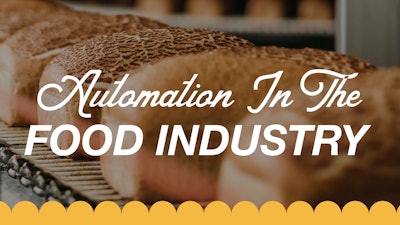
Automation machinery and robot design have made giant leaps forward in recent years. As a result of their wide range of manufacturing capabilities, these revolutionary developments have been making waves across industries. One such industry reaping the benefits is food production. Below is a brief look into the growing impact of automation in the food industry.
The advantages of robotics and automation implementation are practically limitless. Because of all the benefits to manufacturers, more and more are taking on upgrades to keep up with the competition. In fact, according to Deloitte’s 2023 Manufacturing Industry Outlook, an impressive 62% of surveyed manufacturers say they plan to implement robotics and automation this year.
One of the leading advantages these technologies can deliver is improved quality control. Aside from the apparent reduction in human-related errors, automation technology works to enhance production from start to finish through more effective management. As a result, these manufacturing solutions can increase line efficiency, maximize ingredient usage and deliver uniform, high-quality results every time.
Such outcomes are particularly beneficial for facilities with numerous ingredients or complexities involved in production. With automation technology in control, it helps to maintain texture, taste and other product qualities, which strongly influence consumer purchasing decisions. Along the same lines is automation’s potential to reduce the risk of product recalls and, in the long run, protect a brand’s reputation.
Another benefit of automation in the food industry is that it offers manufacturers more flexibility and scalability. The past few years have demonstrated that global supply chain disruption can quickly wreak havoc. Moreover, as the energy crisis worsens, it threatens to disrupt production and may lead to consumer shortages if not prepared properly. By investing in automation, manufacturers may remain agile enough to weather such looming disruptions as it supports adaptability in production capacity.
Lastly, automation has been shown to effectively support food businesses working to improve their supply and demand management. The amount of waste produced around the world has become a global crisis. Food manufacturing processes contribute to that waste significantly, especially in terms of supply chain waste.
Implementing end-to-end automation solutions can help food businesses reduce waste through real-time data and more accurate stock tracking along the entire supply chain. Likewise, this degree of application can help those same organizations avoid misalignments on inventory levels, thus minimizing travel throughout the supply cycle and decreasing their environmental impact.
From standalone robots equipped with fully hygienic pick-and-place capabilities to innovative technologies such as the industrial nut processing conveyor, manufacturers within the food industry are utilizing industrial advancements to improve efficiency and enhance safety. Not only do these solutions help meet rising demands, but also they work to increase productivity on the line and provide end-to-end traceability.
As these technologies expand and grow in sophistication, so too will the means of production within the food industry, providing a more cost-effective solution to feeding the world’s ever-increasing population.

Buffy Hagerman is Marketing Communications Manager at Key Technology, a leading food processing equipment manufacturer. Hagerman is responsible for marketing initiatives that build awareness of the company’s high-performance digital sorting, conveying and process automation solutions worldwide.























